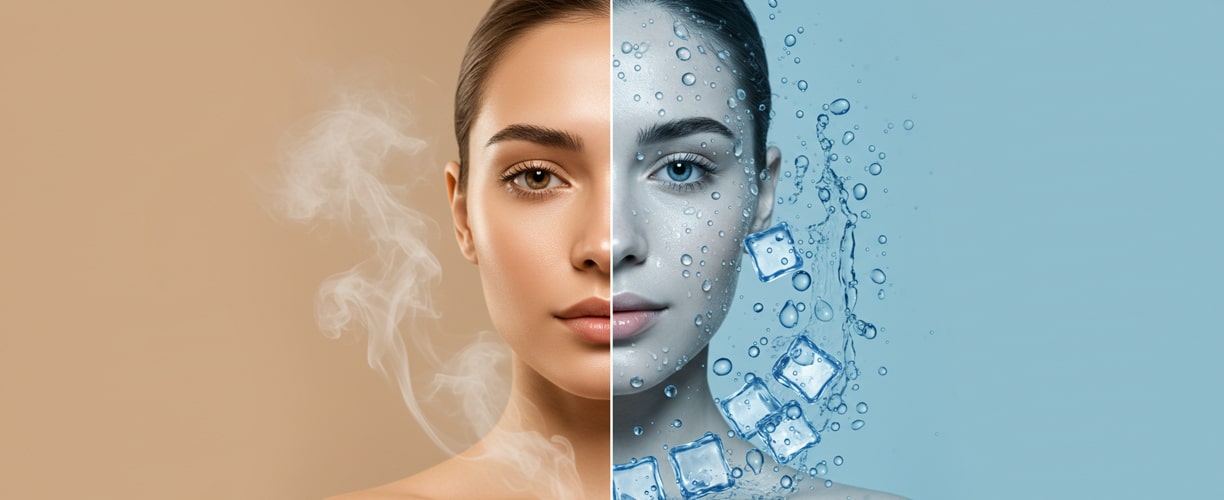Skincare Showdown: When to Use Hot vs Cold Water for Best Results

Is the correct water temperature a crucial ingredient missing from your skincare routine? The debate between hot vs cold water may seem minor, but it can have an important role in the appearance and health of your skin.
Both temperatures have special advantages, such as cold water relaxes and tightens, while hot water helps with thorough cleaning. You can maximize the benefits of each step in your routine by understanding when and how to use each one.
To find the ideal balance for your skin, let’s examine the advantages and disadvantages of each approach according to your skin type.
Why Water Temperature Matters in Skincare
Although it may not seem significant, the temperature of the water has a significant impact on the appearance and texture of your skin. Your skin reacts differently to different temperatures. Besides opening pores and helping remove oil and debris, hot water can also cause skin dryness if used too much. Conversely, cold water tightens the skin and relieves irritation, but it might not be as effective on its own at cleaning.
Selecting the ideal temperature promotes improved product absorption, prevents irritation, and maintains the natural balance of your skin. Modest adjustments to your routine, such as changing the water’s temperature, can have a significant impact on the condition of your skin.
Bonus Read: How To Get Glowing Skin. Discover the key to glowing, healthy skin through expert advice, product suggestions, and daily routines that genuinely impact your complexion.
Hot Water for Skincare: Benefits & Risks
There are advantages and disadvantages to hot water in the debate over hot vs cold water. For a deeper cleanse, when appropriately applied, it help in pore opening, dirt removal, and oil dissolving. This makes it particularly helpful before applying a mask or exfoliating.
However, extended exposure to hot water can remove the skin’s natural oils, leaving it tight, dry, and irritated. Hot water should be used sparingly for most skin types, more as a preparatory step than a daily ritual.
Pros of Using Hot Water
- Opens Pores: Helps remove impurities, oil, and grime for a more thorough and efficient cleanse.
- Readies Skin for Therapy: Improves the penetration of ingredients, increasing the efficiency of exfoliation and masks.
- Removes Extra Oil and Makeup: Dissolves product buildup and sebum that may not be completely removed by cold water.
- Soothes Muscles and Relaxes the Body: In the debate over bathing in hot vs cold water, hot water is often recommended for its stress-reducing and relaxing effects, which are beneficial for both mood and skin.
- Enhances Product Absorption: Serums and moisturizers work more effectively on warmer skin when applied immediately after cleansing.
- Creates a Spa-Like Experience: The warmth provides comfort and relieves stress, making your skincare routine more enjoyable.
Cons of Using Hot Water
- Removes Natural Oils: Dryness and tightness can result from the removal of the skin’s protective oils by hot water.
- Produces Irritation and Redness: For individuals with sensitive or reactive skin types, high temperatures can trigger skin inflammation.
- Worsen Skin Conditions: The heat and additional strain on the skin barrier can worsen conditions like rosacea, eczema, or acne.
- Disrupts Skin Barrier: Frequent use of hot water can weaken the skin’s natural defenses, leaving it more susceptible to environmental harm.
- Leads to Over-Cleaning: The skin may become raw or flaky as a result of over-cleaning, often due to the temptation to scrub harder with hot water.
- Causes Itching or Tightness: The skin may feel itchy or tight after using hot water, especially in low-humidity environments.
Cold Water for Skincare: What You Should Know
Understanding the benefits and drawbacks of using cold water for skincare will help you make more informed decisions for your skin. The positive effects of cold water include pore tightening, reduction of puffiness, decreased inflammation, and skin renewal. It is particularly helpful when addressing redness and irritation or after cleansing.
However, cold water isn’t always the best option. On its own, it may not be able to remove oils, makeup, or impurities effectively, and it may feel too harsh for specific skin types, particularly those with dry skin or those living in colder climates.
The key is balance: Unless your skin benefits from it, use cold water as a final rinse or aftercare step instead of your primary cleansing method.
Benefits of Cold Water
In the debate over cold vs warm water, cold water has several advantages, particularly when incorporated carefully into your skincare routine. This is how it can benefit your skin:
- Reducing Puffiness
Particularly around the eyes in the morning, cold water helps constrict blood vessels, which can lessen swelling and puffiness.
- Soothing Redness
Cold water is ideal for soothing irritated or inflamed skin due to its calming properties, particularly after treatments or sun exposure.
- Pore Tightening
Although cold water doesn’t reduce pores, it can give the appearance of smoother skin by temporarily tightening them.
- Boosting Circulation
The sudden temperature change promotes blood flow to the skin’s surface, resulting in a natural, healthy glow for your complexion.
When comparing cold water vs hot water, cold water is generally gentler on the skin and less likely to cause dryness or irritation, making it a great addition to most routines.
Downsides of Cold Water
When comparing hot vs cold water, even though cold water has its benefits, it isn’t always the ideal choice for every step of your skincare routine. Over time, clogged pores may not be effective in removing excess oil, makeup, or sunscreen.
Lukewarm water is usually more effective for deeper cleansing, particularly after using heavy products or during nighttime routines. Furthermore, particularly in colder climates, very dry or sensitive skin may find cold water too harsh.
Choosing the Right Water for Your Skin Type
Because different skin types react differently to specific water temperatures, changing your routine can have a significant impact. Depending on your skin type, like oily, dry, or sensitive, the temperature of your rinse can either calm or irritate it.
For instance, lukewarm water is usually the safest for daily cleansing, but cold water for skincare is effective, as it soothes irritation and tightens pores. For healthier, more balanced results, follow this brief guide to help you choose hot vs cold water.
Best Temperature for Oily Skin
Your best choice is lukewarm water, as it effectively cleanses and dissolves excess oil without over-stimulating your sebaceous gland. Avoid hot water for skincare as it can strip your skin and increase oil production. Finish with a quick mist of cold water for an extra boost in skin care, reducing shine and tightening pores.
Best Temperature for Dry/Sensitive Skin
The best skincare routine & tips for dry skin are using lukewarm water, which is mild enough to cleanse without causing dryness or irritation. While cold water may be too shocking for sensitive skin, hot water for skincare can be too harsh, as it removes natural oils. To lock in moisture and smooth the skin barrier, gently pat dry after rinsing and apply a rich moisturizer immediately.
Best Temperature for Acne-Prone Skin
Since it effectively removes excess oil, dirt, and product buildup without causing inflammation, lukewarm water is ideal for skin prone to acne. Despite the temptation to use hot water for skincare, this can cause breakouts by irritating the skin.
Wondering is cold water good for you? A cool rinse can help reduce redness, tighten pores without clogging them, and soothe active breakouts.
How to Wash Your Face the Right Way
The health of your skin can be significantly improved by following a proper face-washing routine. To properly cleanse without stripping or irritating your skin, follow these easy steps:
Step 1: Apply a Mild Cleaner
Select a mild cleanser that suits your skin type. It should be gentle enough to remove oil and debris without stripping your skin’s protective layer.
Step 2: Select the Appropriate Water Temperature
Use only lukewarm water. Unlike hot vs cold water, it cleanses your skin effectively without shocking or drying it out.
Step 3: Don’t Overdo:
Face washing should only be done twice a day, in the morning and at night. Excessive cleaning can strip the skin of vital oils, leading to irritation or dryness.
Step 4: Apply a Moisturizer:
After washing, lock in hydration immediately. When your skin is still slightly damp, apply your moisturizer to seal in moisture, boost absorption, and prevent dryness throughout the day.
Expert Tip: Lukewarm Water Might Be the Best of Both Worlds
For your skincare routine, lukewarm water is comparatively the safest and best option when in doubt. It is warm enough to help in the removal of debris and pollutants while being gentle enough to protect your skin’s natural oils. Lukewarm water is ideal for most skin types because it minimizes irritation while optimizing results.
Shop Eshaistic’s Skin Care Products for Every Routine
Upgrade your skin care game with Eshaistic’s carefully curated selection of Medicube products, designed to deliver visible results and suit every skin type. Whether you’re aiming for deep hydration, improved elasticity, or a brighter complexion, our lineup offers something practical for every step of your routine. Get to know more about Medicube products, contact us!
Medicube PDRN Pink Hyaluronic Moisturizing Cream
This hyaluronic-rich cream will soothe, plump, and hydrate your skin. It is ideal for soothing sensitive skin and restoring moisture balance, as it is infused with pink centella and PDRN. Perfect for strengthening the skin barrier and locking in moisture after a cold water rinse.
Medicube Collagen Niacinamide Jelly Cream
Over time, this revitalizing jelly cream, rich in collagen and niacinamide, helps support firmness, improve texture, and brighten dull skin. Its easy-to-absorb, lightweight formula makes it perfect for everyday use, especially after washing with lukewarm water.
Medicube Triple Collagen Cream
After cleansing with hot water, give your skin the bounce it needs. Three forms of collagen are added to this incredibly nourishing cream to strengthen the skin barrier, restore elasticity, and provide a firmer, smoother appearance.
Still Confused? Get a Personalized Skin Routine with Eshaistic
Not sure where to start? Let Eshaistics guide you! Explore our thoughtfully curated selection of skincare products, designed for every skin type and need. We’re here to help you find the perfect products for your skincare journey concerns. Whether you’re battling dryness, breakouts, or dullness, we’ve got something just for you.
Discover your perfect skincare routine today, your skin will thank you!
FAQs – Hot vs Cold Water
Is cold water good for acne?
Yes, cold water can be beneficial for acne in specific ways, but it’s not a cure-all. Cold water can help reduce inflammation and redness associated with acne, and constrict blood vessels, potentially reducing puffiness.
Can I use hot water every day on my face?
No, daily use of hot water on your face is not advisable because it can damage your skin. Hot water tends to remove the skin’s natural oils, which can cause dryness, irritation, and worsen some skin conditions.
Does water temperature really make a difference?
Water temperature influences its application and impact on the body. Varying temperatures can affect the complexion and texture of the skin.
Wrap Up
There is no one-size-fits-all solution when it comes to hot vs cold water. Instead, it all depends on using each temperature wisely, considering your skin’s needs or laundry requirements objectives. While cold water calms, tightens, and retains moisture, hot water helps open pores, remove oil, and provide thorough cleansing.
In a nutshell.. Instead of taking sides, use both strategically. Knowing when to use each temperature makes all the difference, whether you’re cleaning your face or having a skincare routine. To get the most out of your routine, check out our tips & skincare guide for more insightful information.


